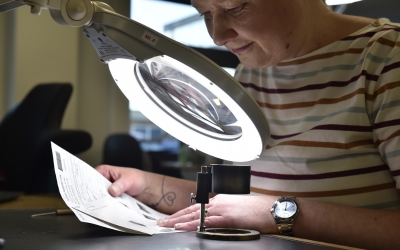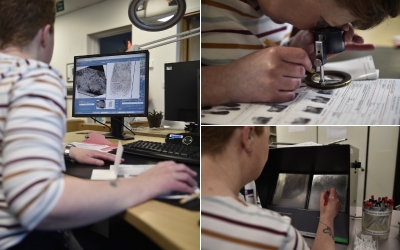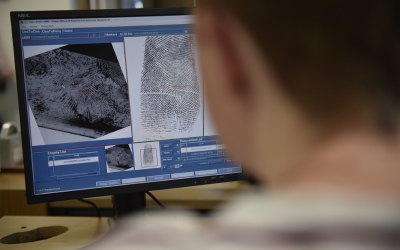Meet Jo, Reporting Fingerprint Identification Officer (RFIO)
Length of Service: 25 years
Becoming a Reporting Fingerprint Identification Officer (RFIO)
 When I joined TVP I didn’t really know much about forensics, it was before the television show ‘CSI’ made the whole subject really popular. I was looking for a job that was a bit different every day as I had been working on the news desk of a local newspaper.
When I joined TVP I didn’t really know much about forensics, it was before the television show ‘CSI’ made the whole subject really popular. I was looking for a job that was a bit different every day as I had been working on the news desk of a local newspaper.
I was a trainee Fingerprint Officer for 5 years (the average time now to qualify is between 3 and 5 years) dealing with casework in the office as well as taking external practical and theory exams working towards becoming an expert.
I had to pass mock court exams to prepare me for giving evidence as an expert witness in court.
I passed my final exams in January 2003 and my name was placed on the National Register of Fingerprint Experts. I have to pass bi-annual competency checks as part of our quality assurance procedures, it’s a very specialised job and many of the team in the Fingerprint Bureau have had very long careers in fingerprints.
Life as a Reporting Fingerprint Identification Officer (RFIO)
 We work shifts and weekends and operate an on-call rota so that there is always at least two RFIO’s available 24/7, 365 days a year. Our case load is varied; from volume crime cases (with just a couple of fingerprint marks on that could take an hour or two) to complex murder or counter-terrorism cases that can take weeks or months to complete.
We work shifts and weekends and operate an on-call rota so that there is always at least two RFIO’s available 24/7, 365 days a year. Our case load is varied; from volume crime cases (with just a couple of fingerprint marks on that could take an hour or two) to complex murder or counter-terrorism cases that can take weeks or months to complete.
We often work on cases more than once as new information is received. As well as working in the office we can be called to serious crime scenes, custody suites to quality assess fingerprints taken for terrorism offences or the Fingerprint Development Laboratory to assess marks. Fingerprints are also used as a method of identifying deceased people, so we can be called to a mortuary to carry out identification work.
We prioritise our own workloads, fitting in volume crime amongst major crime cases and urgent fingerprint checks on people in police custody in fast time, sometimes this can mean working under pressure. We may use professional judgement on a case to make decisions as to what work to carry out to maximise the potential for getting identifications.
All fingerprint identifications are checked by two RFIOs so we might be carrying out an initial comparison on marks or be checking the work of another officer as the final check on an identification. We work in teams of a few RFIO’s, so you have a lot of contact with colleagues who are able to offer help or advice if needed but you need to be able to concentrate for sometimes long periods of time looking at small detail.
Most of the comparisons we carry out are still done manually under an eyeglass, although some are done on computer via AFIS (Automatic Fingerprint Identification System). We might also be required to produce an evidential statement, and present this evidence at court. Particularly in major crime we often liaise with police officers, other police staff, barristers and court staff and sometimes experts for the defence. We sometimes attend forensic strategy meetings.
 Working on serious crime can sometimes mean working under time pressures, particularly in major crime cases where offenders are unknown. Each case you deal with may have unpleasant or distressing details or images. Work at the mortuary or on scenes can involve lone travel to different locations and long hours in sometimes difficult circumstances.
Working on serious crime can sometimes mean working under time pressures, particularly in major crime cases where offenders are unknown. Each case you deal with may have unpleasant or distressing details or images. Work at the mortuary or on scenes can involve lone travel to different locations and long hours in sometimes difficult circumstances.
The importance of support and wellbeing is much more acknowledged now, both for physical and mental health. In the Fingerprint Bureau there will always be a colleague around to have a chat with if you’ve been dealing with something difficult. There is also support from TVP’s Occupational Health Department, plus we have welfare visits from the Oscar Kilo team (a national police welfare service). The visits from the welfare dogs are always very popular!
The future… Things have changed a lot over the past 25 years. When I arrived, the Fingerprint Bureau had three AFIS machines with a rota for everyone to use them. A lot of searching of unidentified marks still took place manually and involved lots of paperwork. Now, fingerprints are almost all taken on machines (Livescan) and stored digitally and everyone in the Bureau has access to their own AFIS terminal as well as lots of other technological systems to provide us with up to date information on cases.
We can now search fingerprint marks on Immigration and other European countries databases. Technology is constantly changing and several new systems are in the pipeline for fingerprints, along with a brand new purpose built forensics building.
It’s an exciting time to be joining Forensics as a career. I still really enjoy my job and get a lot of satisfaction from my role in helping to identify offenders, prevent crime and keep people safe.
The key skills & considerations in becoming an RFIO
- Attention to detail & patience – the ability to concentrate on small detail for long periods and produce accurate results. Jobs can take many hours to complete over long periods of time, sometimes looking at poor quality marks
- Flexibility & teamwork – the ability to manage your own workload, prioritise tasks and be flexible to help others in the team.
–
Learn more about our Forensics department and their current vacancies by visiting our Forensics page.


 Facebook
Facebook
 Twitter
Twitter
 Linkedin
Linkedin
 Instagram
Instagram